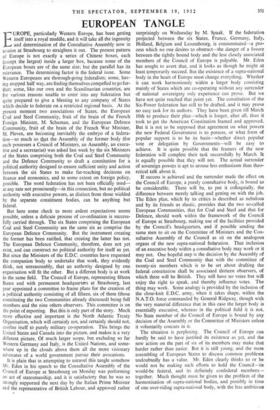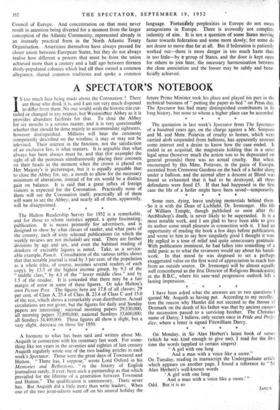EUROPEAN TANGLE
EUROPE, particularly Western Europe, has been getting itself into a royal muddle, and it will take all the ingenuity and determination of the Consultative Assembly now in session at Strasbourg to straighten it out. The present pattern of Europe is not exactly a series of Chinese boxes, each (except the largest) inside a larger box, because some of the European boxes are of the same size; but the parallel has its relevance. The determining factor is the federal issue. Some Western Europeans are thorough-going federalists; some, hav- ing stopped half way, are finding themselves compelled to go fur- ther; some, like our own and the Scandinavian countries, are for various reasons unable to enter into any federation but quite prepared to give a blessing to any company of States which decide to federate on a restricted regional basis. At the present moment two associations of States, the European Coal and Steel Community, fruit of the brain of the French Foreign Minister, M. Schuman, and the European Defence Community, fruit of the brain of the French War Minister, M. Pleven, are becoming inevitably the embryo of a federa- tion—so much so that the Assembly of the former body (for each possesses a Council of Ministers, an Assembly, an execu- tive and a secretariat) was asked last week by the six Ministers of the States comprising both the Coal and Steel Community and the Defence Community to draft a constitution for a political,authority designed to ensure sufficient unity and action between the six States to make far-reaching decisions on finance and economics, and to some extent on foreign policy, possible. The word federation has not been officially used— at any rate not prominently—in this connection, but no political authority with executive powers, as distinct from those wielded by the separate constituent bodies, can be anything but federal.
But here some check to more ardent expectations seems possible, unless a delicate process of co-ordination is success- fully carried through. The six States comprising the European Coal and Steel Community are the same six as comprise the European Defence Community. But the instrument creating the former has been ratified, that creating the latter has not. The European Defence Community, therefore, does not yet exist, and can construct no political authority for itself as yet. But since the Ministers of the E.D.C. countries have requested the companion body to undertake that work, they evidently think, not unreasonably, that an authority designed by one organisation will fit the other. But a different body is at work in the same field. The Council of Europe, representing fifteen States and with permanent headquarters at Strasbourg, last year appointed a committee to frame plans for the creation of a political authority consisting of all fifteen, six of them (those constituting the two Communities already discussed) being full members and the nine others observers. This committee is on the point of reporting. But this is only part of the story. Much more effective and important is the North Atlantic Treaty Organisation, which will certainly not, and certainly should not, confine itself to purely military co-operation. This brings the United States and Canada into the picture, and makes it a very different picture. Of much larger scope, but excluding so far Western Germany and Italy, is the United Nations, and some- where up in the clouds above them all the more visionary advocates of a world government pursue their avocations.
It is plain that in attempting to unravel this tangle somehow Mr. Eden in his speech to the Consultative Assembly of the Council of Europe at Strasbourg on Monday was performing an act of statesmanship, and it is satisfactory that he was so strongly supported the next day by the Italian Prime Minister and the representative of British Labour, and approved rather surprisingly on Wednesday by M. Spaak. If the federation projected between the six States, France, Germany, Italy.
Holland, Belgium and Luxembourg, is consummated—a pro- cess which no one desires to obstruct—the danger of a fissure between-the tightly bound body and the less closely associated members of the Council of Europe is palpable. Mr. Eden has sought to avert that, and it looks as though he might at least temporarily succeed. But the existence of a supra-national body in the heart of Europe must change everything. Whether it can work harmoniously within a larger body consisting mainly of States which are co-operating without any surrender of national sovereignty only experience can prove. But we have not quite reached that point yet. The constitution of the Six-Power federation has still to be drafted, and it may prove no easy task for its authors. They have been given till March 10th to produce their plan—which is longer, after all, than it took to get the American Constitution framed and approved. But it is not to be supposed that agreement on what powers the new Federal Government is to possess, or what form of popular support is to be its basis—whether direct popular vote or delegation by Governments—will be easy to achieve. It is quite possible that the framers of the new federation will complete their task successfully by March. It is equally possible that they will not. The actual surrender of sovereign powers is apt to arouse less enthusiasm than theo- retical talk about it.
If success is achieved and the surrender made the effect on the Council of Europe, a purely consultative body, is bound to be considerable. There will be, to put it colloquially, the difference between merely talking and getting on with the job. The Eden plan, which by its critics is described as nebulous and by its friends as elastic, provides that the two so-called European Communities, that for Coal and Steel and that for Defence, should work within the framework of the Council of Europe at Strasbourg, making use of the facilities provided by the Council's headquarters, and if possible sending the same men to sit on the Committee of Ministers and the Con- sultative Assembly of the Council as sit on the analogous organs of the new supra-national federation. That inclusion of an executive body within a consultative body may work or it may not. One hopeful step is the decision by the Assembly of the Coal and Steel Community that with the committee of twenty-six members which is to be set about drafting the federal constitution shall be associated thirteen observers, of which three will be British. They will have no votes but will enjoy the right to speak, and thereby influence votes. The thing may work. Some analogy is provided by the inclusion of the close-knit E.D.C. army, when it takes shape, within the N.A.T.O. force commanded by General Ridgway, though with the very material difference that in this case the larger body is essentially executive, whereas in the political field it is not. No State member of the Council of Europe is bound by any decision of the Assembly or the Committee of Ministers unless it voluntarily concurs in it.
The situation is perplexing. The Council of Europe can hardly be said to have justified its existence as yet, and the new action on the part of six of its members may make that harder rather than easier. But it is still young, and the mere assembling of European States to discuss common problems undoubtedly has a value. Mr. Eden clearly thinks so or he would not be making such efforts to hold the Council—its would-be federal, and its definitely confederal members— together. Much thought must be given to the problem of the harmonisation of- supra-national bodies, and possibly in time of one over-riding supra-national body, with the less ambitious Council of Europe. And concentration on that must never result in attention being diverted for a moment from the larger conception of the Atlantic Community, represented already in an intensely practical form in the North Atlantic Treaty Organisation. Americans themselves have always pressed for closer union between European States, but they do not always realise how different a process that must be from the union achieved more than a century and a half ago between thirteen thinly-populated colonies which had till then owned a common allegiance, shared common traditions and spoke a common language. Fortunately perplexities in Europe do not mean antagonisms in Europe. There is avowedly not complete indentity of aim. It is not a question of some States moving faster towards federation and some more slowly; for some do not desire to move that far at all. But if federation is patiently worked out—there is more danger in too much haste than in too little—by a-group of States, and the door is kept open for others to join later, the necessary harmonisation between the close association and the looser may be safely and bene- ficially achieved.



































 Previous page
Previous page